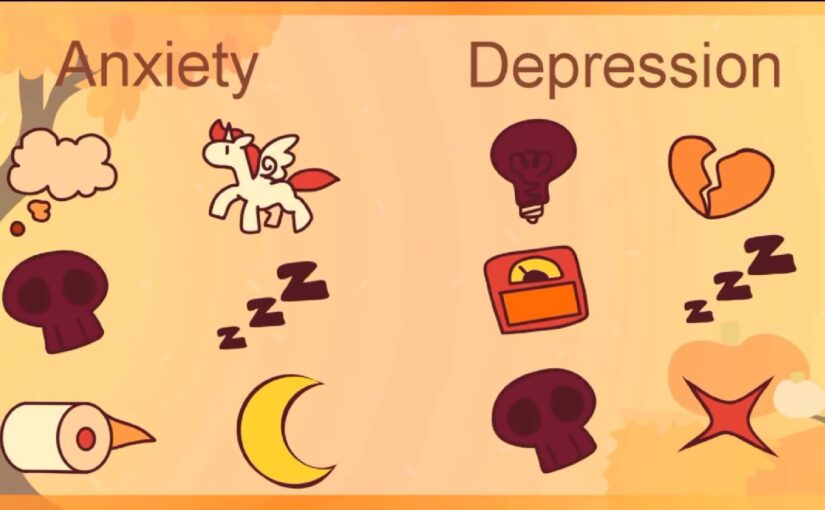Hey, Psych2Goers! Before we begin, we want to give every one of you a big thank you. We, at Psych2Go, are individuals
who work hard every day to provide quality content
for you all to see. Thanks to you,
we are closer to reaching our goal of making psychology
more accessible to everyone. Now, onto the video. Anxiety and depression
may be confusing, especially if a person
is struggling with both. These mental disorders
can be comorbid, meaning someone with depression,
can also have anxiety symptoms and vice versa. But first, what exactly is
anxiety and depression? According to Medical News Today, anxiety disorders occur when
a person regularly feels disproportional
levels of distress, worry, or fear over an
emotional trigger, while depression is
a mood disorder characterized by persistently
low mood in a feeling of ssadnessand loss of interest. Living with both disorders
can be challenging. Let’s have a look at the different and common
symptoms of anxiety and depression. Some anxiety symptoms are,
but not limited to, excessive and ongoing worry
and tension, an unrealistic view of problems, a sense of impending danger,
panic or doom, restlessness or fatigue, the need to go to
the bathroom frequently, and insomnia.Some depression symptoms are, but again, not limited to, the feeling of being hopeless, the loss of interest in things,
or activities you once enjoyed, appetite changes and weight
fluctuations, insomnia or hypersomnia, suicidal thoughts or attempts,
and self-harming. Some common symptoms
between the two appear to be insomnia,
fatigue, and irritability, all of which impair your ability
to perform everyday tasks. Both mental disorders, although
different, share symptoms making it difficult to understand
which is which. The differences can be observed
in how anxiety and depression manifest. Anxiety disorders are oriented
toward the future. It is characterized by excessive
fear and worry, which in turn, will affect the person’s
behavior. This occurs when people
overestimate the danger in situations. In severe cases, people will avoid
the situation that causes them anxiety. Individuals can experience
sensations of impending doom or feeling on edge 24/7. If the anxiety disorder is not
controlled on time, people can experience
panic attacks, and their daily functions
will become affected. Depressive disorders,
on the other hand, are oriented towards the past. People tend to fixate on
negative situations that impact them.Individuals experience diminished
interest in most activities if not all. Physically, depressed people can
exhibit psychomotor retardation. This includes slowed speech
and decreased movement. Depression also affects
sleeping patterns. People will either sleep too little,
which can lead to insomnia, or too much, which can
lead to hypersomnia. Individuals with depression have
feelings of worthlessness, guilt, or emptiness. In severe cases, people will have recurrent
thoughts of death, and suicide, or make attempts
to do so. We hope this video
helps you understand what you or a loved one
may be going through. Please, keep in mind that
if you’re struggling with either or both disorders,
you are not alone. Asking for help
does not make you weak.So, please don’t feel ashamed
to do so. If you think you may be
exhibiting signs of anxiety or depression, please see a licensed professional. Feel free to share your story
with us in the comments below. If you thought this video was helpful,
please give us a like and share this with someone
you think could use the help. If you want to watch more
videos related to this topic, try checking out our
mental health care playlist. If you want more psychology content,
be sure to subscribe, and as always,
thanks for watching!
305,077 views • Oct 12, 2019 • #depression #psych2go #anxiety
Anxiety and depression may be confusing, especially if a person has both. These mental disorders can be co-morbid. Someone with depression can have anxiety symptoms, and vice versa. So, what’s the difference between anxiety and depression? If you’re looking for affordable and convenient therapy to deal with stress, anxiety, or depression, please check out our sponsor BetterHelp: http://betterhelp.com/Psych2Go http://betterhelp.com/Psych2Go #depression #anxiety #psych2go ᵛᶦᵈᵗᵒᵒⁿ™ ².¹
ᴏɴᴇ ᴛɪᴍᴇ ᴏꜰꜰᴇʀ – ᴛʜᴇ 2ᴅ ᴀᴍɪɴᴀᴛɪᴏɴ ᴠɪᴅᴇᴏ ᴍᴀᴋᴇʀ After The Massive Success Of VidToon™ 1.0
And More Than 10ᴋ Happy Customers…WE ARE BACK ON Popular Demand! Redefine Profitability With The World’s Easiest & Most Popular Video Animation Software
It’s ʙɪɢɢᴇʀ. ʙᴇᴛᴛᴇʀ. ᴀɴᴅ ꜰᴀꜱᴛᴇʀ.




